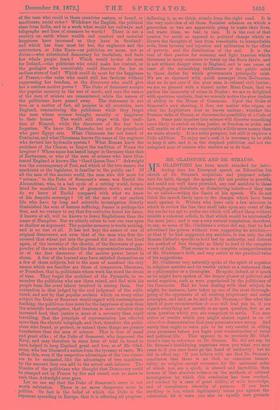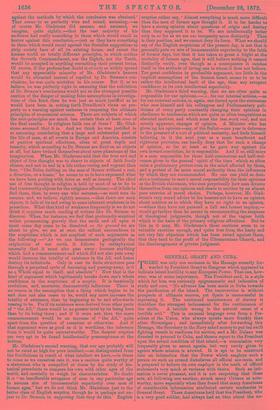MR. GLADSTONE AND DR. STRAUSS.
AIR. GLADSTONE has been much attacked for intro- ducing into his Liverpool speech on Education his sketch of Dr. Strauss's scepticism and proposed substi- tute for faith, though the speaker did not profess to provide, and could not well have provided, any real antidote to these thorough-going disbeliefs, or disbelieving beliefs—if they can be so called—within the limits of his speech. We do not think the speech fairly open to the charges which have been made against it. Writers who have only a few minutes in which to review the line they shall take upon any event of the day are far too apt to prefer one which will afford them without trouble a coherent article, to that which would be intrinsically the most just ; and it was a very natural temptation, therefore, to say, as some of Mr. Gladstone's critics did say, that he had advertised the poison without even suggesting an antidote,— or that if he had suggested any antidote, it was only the old Roman Catholic specific to hold fast by authority, and distrust the method of free thought as likely to lead to the complete wreck of faith. That seems to us a complete misapprehension of Mr. Gladstone's drift, and very unfair to the practical value of his suggestions.
Mr. Gladstone very naturally spoke of the spirit of negation in religious matters and its results rather as a statesman than as a philosopher or a theologian. He spoke, indeed, of it much as he might have spoken of the deeper phases of political and social negation, such as were popularised by the politicians of the Commune. Had he been dealing with that subject, he might, for instance, have taken up one of the most thorough- going of the opponents of all existing proprietary and social principles, and said, as he said of Dr. Strauss,—' See what the spirit of pure reconstruction de novo will lead you to, if you regard everything not merely as an open question, but as an open question which you are competent to settle, You may arrive at results which you might almost regard as an ad absurdum demonstration that your premisses were wrong. And surely that ought to warn you to be very careful in sifting your promisees before you begin your reconstruction of social and political life.' That appears to us precisely Mr. Glad- stone's tone in reference to Dr. Strauss. He did not say, let Dr. Strauss's bewildering negations warn you what you may come to if you once leave go the hand of authority ; but he did in effect say, If you believe with me that Dr. Strauss's
conclusion that there is no God, no conscious immor- tality, no religion except reverence for the universal order of which you are a speck, is absurd and incredible, then beware of that absolute reliance on the methods of rational investigation by which this conclusion has been reached,
and reached by a man of great ability, of wide knowledge, and of conspicuous sincerity of purpose. If you have anything in you which legitimately warns you against the conclusion, let it warn you also on equally sure grounds
against the methods by which the conclusion was obtained.' That seems to us perfectly wise and sound, assuming,—as of course Mr. Gladstone did assume, and assumed, we imagine, quite rightly,—that the vast majority of his audience had really something in them which would recoil in horror against this conclusion,—just as they have something in them which would recoil against the Socialist suggestions to strip society bare of all its existing forms, and recast the human world on totally different principles, in which neither the Seventh Commandment, nor the Eighth, nor the Tenth, would be accepted in anything resembling their present forms. Of course, if the profoundest doubt is already so widely spread that any appreciable minority of Mr. Gladstone's hearers would be attracted instead of repelled by Dr. Strauss's con- clusions, he was quite mistaken in his course. But if, as we believe, he was perfectly right in assuming that the exhibition of Dr. Strauss's conclusions would act as the strongest possible caution of the danger of making false assumptions in investiga- tions of this kind, then he was just as much justified as he would have been in setting forth Proudhon's views on pro- perty as a warning against rashness in reopening the ultimate principles of economical science. There are subjects of which the root-principles are much less certain than at least some of the final results. Is religious faith one of them ? Mr. Glad- atone assumed that it is. And we think he was justified in so assuming, considering that a large and substantial part of the life of man, at all events in Europe and America, consists of positive spiritual affections, often of great depth and tenacity, which according to Dr. Strauss are fixed on no objects at all, but have twined themselves about mere phantoms of the imagination. . When Mr. Gladstone said that the true end and object of free thought was to cleave to objects of faith freely chosen, and not to end in a life rather roving and vagrant than free, "like Delos drifting on the seas of Greece without a rest, a direction, or a home," he seems to us to have expressed what we have been putting with force as well as beauty. The chief use of free thought in religion is held by most of us to be to find trustworthy objects for the religious affections ;—if it fails to find them, then, to every one who assumes,—as most men do assume, and, we believe, rightly assume,—that there are such objects, it fails of its end owing to some inherent weakness in its procedure. What that kind of weakness frequently is we do not think it requires much reading of writers like Dr. Strauss to discover. When, for instance, we find that profoundly sceptical writer pronouncing gravely that the earth and all upon it
must some day come to be dissolved on the ground we are about to give, we see at once the radical unsoundness in the scepticism which is not sceptical of such arguments as the following :—" As we can demonstrate geologically the origination of our earth, it follows by metaphysical necessity that it must also pass away : because anything which had a commencement and which did not also pass away would increase the totality of existence in the All, and hence destroy its infinitude. Only in case its finite structures pass through a perpetual cycle of becoming and passing-away, is it as a Whole equal to itself, and absolute"! Now that is the kind of argument which legitimately breaks down one's whole confidence in the scepticism of a sceptic. It is fanatically credulous, and, moreover, demonstrably fallacious. There is no reason in the assumption that a thing which begins to be and does not also cease to be, would any more increase the totality of existence, than by beginning to be and afterwards ceasing to be. For if its existence were derived from other parts of " the All," there would be no greater total by its being here than by its being there ; and if it were not, then the mere commencement would be an increase of " the All," quite apart from the question of cessation or otherwise. And if that argument were as good as it is worthless, the inference from it would be quite untrustworthy. The deepest sceptics are very apt to be found intellectually presumptuous at the bottom.
Mr. Gladstone's second warning, that our age probably will not be rated so high for pure intellect,—as distinguished from the fruitfulness in result of what intellect we have,—in times to come as we ourselves rate it, was a caution quite worthy of a statesman who is compelled at times by his study of his- torical precedents to compare his own with other ages of the world, and mentally to weigh its characteristics. No doubt it is "an insufferable arrogance of men in any particular age to assume airs of immeasurable superiority over men of former ages," but we do not think Mr. Gladstone just to the better class of English sceptics, though he is perhaps not un- just to Dr. Strauss, in supposing that they do this. English sceptics rather say, Almost everything is much more difficult than the men of former ages thought it. It is far harder to have a strong opinion about questions of origin and destiny than they supposed it to be. We are intellectually better only in so far as we see our incapacity more distinctly.' That is their position, and we cannot deny its force. What we should say of the English scepticism of the present day, is not that it generally puts on airs of immeasurable superiority to the faith of former days, but that it has taken so great a fright at the credulity of former ages, that it will believe nothing it cannot distinctly verify, even though as a consequence it catches itself in the attitude of loving one in whom it does not believe. Too great confidence in producible argument, too little in the implicit assumptions of the human heart, seems to us to be rather the intellectual fault of the age, than any arrogant confidence in its own intellectual superiority.
Mr. Gladstone's third warning, that we are often quite as responsible for our opinions,—i.e., for our internal actions,—as for our external actions, is, again, one forced upon the statesman who sees himself and his colleagues and Parliamentary poli- ticians of every party constantly changing their opinions in obedience to tendencies which are quite as often temptations as elevated motives, and which none the less work real, and not merely apparent, changes of opinion. A Minister who has given up his opinion—say, of the Ballot—one year in deference to the pressure of a sort of political necessity, and finds himself believing in it the next year as a most beneficent and righteous provision, can hardly deny that for such a change of opinion, so far at least as he gave way against his own inward conviction, he is responsible. And if so, still more is a man responsible for those half-concessions and half-wel- comes given to the general spirit of the time ' which so often raise a preliminary protest even in the mind affected by them, and a protest of far more moral authority than the influences by which they are recommended. No one can yield so deci- sive a testimony to men's moral responsibility for their opinions as the British statesman, who sees perpetually how men divorce themselves from one opinion and cleave to another by an almost pure exercise of moral choice. Perhaps, however, Mr. Glad- stone's very sound advice to his hearers not to have an opinion about matters as to which they have no right to an opinion,
—where they have not pursued a full and honest inquiry,—
would go farther than he meant in recommending the suspense of theological judgments, though not of the vaguer faith which is the basis of the primary religious affections. But be this as it may, Mr. Gladstone's three cautions seem to us valuable cautions enough, and quite free from the hasty and not very fair objection which has been raised against them, that they tend to the profit of the Ultramontane Church, and the discouragement of private judgment.



































 Previous page
Previous page